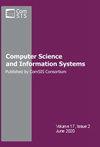Internet of things and agent-based system to improve water use efficiency in collective irrigation
IF 1.2
4区 计算机科学
Q4 COMPUTER SCIENCE, INFORMATION SYSTEMS
引用次数: 1
Abstract
The efficient management of water resources is a major issue in the field of sustainable development. Several models of solving this problem can be found in the literature, especially in the agricultural sector which represents the main consumer through irrigation. Therefore, Irrigation management is an important and innovative field that has been the subject of several types of research and studies to deal with the different activities, behaviors, and conflicts between the different users. This article introduces an intelligent irrigation system based on smart sensors that can be used moderately and economically to monitor farms by integrating some connected electronic devices and other advantageous instruments widely used in the field of IoT, it determines the water requirement of each farm according to the water loss due to the process of evapotranspiration. The water requirement is calculated from data collected from a series of sensors installed in the plantation farm. This project focuses on smart irrigation based on IoT and agent technology, it can be used by farmer associations whose endowments and irrigation planning are defined according to the need and quantity of water available in the rural municipality. The system includes a microcontroller with the integration of sensors, actuators, and valve modules where each node serves as an IoT device. Environmental parameters are monitored directly through a multi-agent system that facilitates the control of each node and the configuration of irrigation parameters. The amount of water calculated for irrigation is based on the Penman model for calculating the daily evapotranspiration baseline. Compared to the conventional irrigation method, it is expected that the proposed irrigation model would contribute to saving water use and distributing it impartially without compromising its production.利用物联网和代理系统提高集体灌溉用水效率
水资源的有效管理是可持续发展领域的一个重大问题。在文献中可以找到解决这个问题的几个模型,特别是在农业部门,它通过灌溉代表了主要的消费者。因此,灌溉管理是一个重要的创新领域,已经有几种类型的研究和研究来处理不同用户之间的不同活动、行为和冲突。本文介绍了一种基于智能传感器的智能灌溉系统,通过集成一些联网的电子设备和物联网领域广泛使用的其他优势仪器,可以适度经济地监控农场,根据蒸发过程中的水分损失来确定每个农场的需水量。需水量是根据安装在种植园农场的一系列传感器收集的数据计算出来的。该项目侧重于基于物联网和代理技术的智能灌溉,它可以被农民协会使用,他们的禀赋和灌溉计划是根据农村自治市的用水需求和数量来定义的。该系统包括一个集成了传感器、执行器和阀门模块的微控制器,其中每个节点都充当物联网设备。通过多代理系统直接监测环境参数,方便控制每个节点和配置灌溉参数。灌溉用水量的计算是基于计算日蒸散基线的Penman模型。与传统的灌溉方法相比,预计所提出的灌溉模式将有助于节约用水和公平分配,而不影响其产量。
本文章由计算机程序翻译,如有差异,请以英文原文为准。
求助全文
约1分钟内获得全文
求助全文
来源期刊

Computer Science and Information Systems
COMPUTER SCIENCE, INFORMATION SYSTEMS-COMPUTER SCIENCE, SOFTWARE ENGINEERING
CiteScore
2.30
自引率
21.40%
发文量
76
审稿时长
7.5 months
期刊介绍:
About the journal
Home page
Contact information
Aims and scope
Indexing information
Editorial policies
ComSIS consortium
Journal boards
Managing board
For authors
Information for contributors
Paper submission
Article submission through OJS
Copyright transfer form
Download section
For readers
Forthcoming articles
Current issue
Archive
Subscription
For reviewers
View and review submissions
News
Journal''s Facebook page
Call for special issue
New issue notification
Aims and scope
Computer Science and Information Systems (ComSIS) is an international refereed journal, published in Serbia. The objective of ComSIS is to communicate important research and development results in the areas of computer science, software engineering, and information systems.
 求助内容:
求助内容: 应助结果提醒方式:
应助结果提醒方式:


